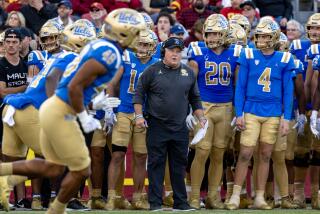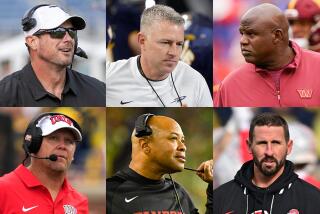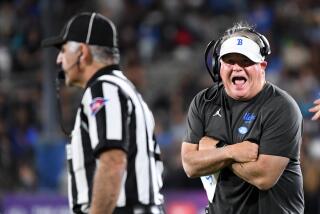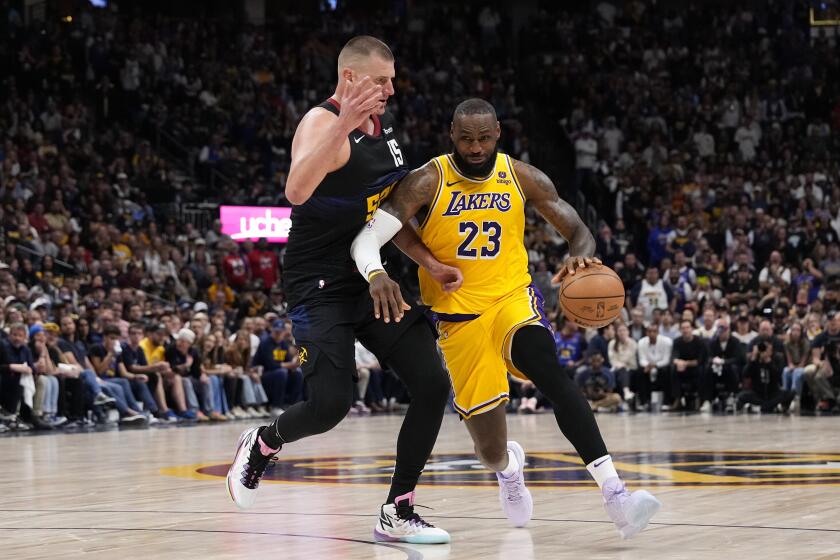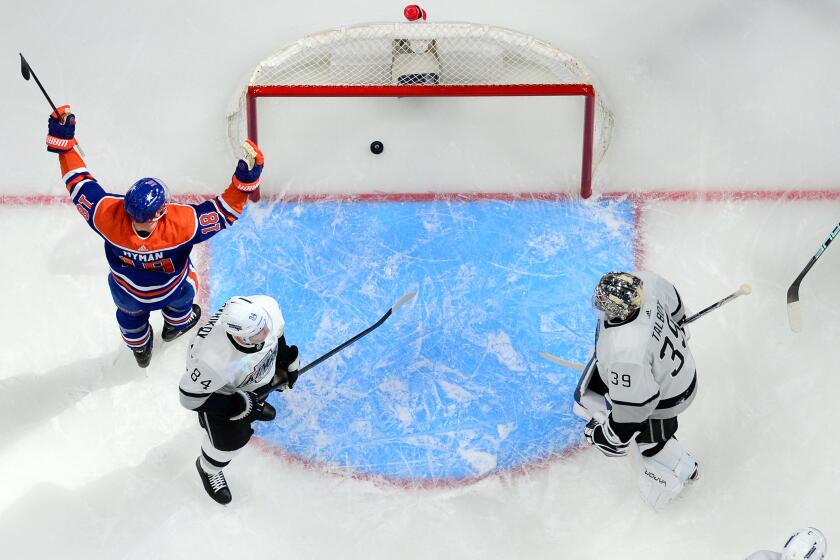Can Chip Kelly’s offense work in the pros?
The idea is undeniably intriguing: Oregon Coach Chip Kelly in the NFL, bringing his up-tempo offense to the highest level.
Sure, it could be a flop of Steve Spurrier-like proportions, a star college coach watching his Saturday system fizzle in such a spectacular way on Sundays. But it could work too, seeing as most NFL teams have some version of a read-option offense in their playbooks. We’ve seen San Francisco run it with Colin Kaepernick, Seattle run it with Russell Wilson and Washington run it with Robert Griffin III.
So the rumors swirling that several teams are eyeing Kelly aren’t that crazy at all. There has been lingering speculation that Kelly could replace Andy Reid in Philadelphia, for instance.
Kelly can evolve and adapt. He has done that successfully with the Ducks. Not every running back has to be a 5-foot-8, 195-pound water bug like LaMichael James. The burly Jonathan Stewart had a stellar career at Oregon and was a first-round pick.
But before any team made the leap to hire Kelly, any clear-headed general manager would have to get some important answers. Among the pertinent questions:
How do you protect the quarterback? The quarterback is much more exposed in Kelly’s type of system, particularly when he’s carrying the ball. Lots of big hits. We’ve already seen Griffin go down with a concussion this season. (Yes, we’ve seen lots of traditional drop-back quarterbacks sustain concussions too. But Kelly’s quarterback is going to take more hits.)
How are you going to work with these players? It typically takes at least a couple of years for a coach to overhaul a roster. That means Kelly would need to work with a team’s current players, at least in the short term. If he’s hired, the real test of genius is how he transforms a 330-pound offensive lineman into a marathoner who can stay on the field for 100 offensive snaps a game. That’s some serious conditioning, and we’re not talking about a 100-man college roster.
Can your defense handle the workload? Say the offense takes a year or two to get rolling, and maybe leads the league in three-and-outs in the interim. That’s entirely possible. That defense is going to be on the field a lot. It would get old fast for a defense if it’s skulking back on the field after its offensive counterpart had three quick snaps and a punt.
How do you deal with NFL defensive fronts? Oregon’s offensive linemen spread out a bit more, and those wide splits don’t hurt the Ducks. Can’t do that in the pros, though. NFL defensive linemen are quicker penetrators and extremely disciplined. If they have more room to blow up plays in the backfield, they will.
You do know there are no Tennessee Techs on the schedule, right? A college team might play 13 games, and a lot of those are blowouts that allow for second- and third-stringers to play after halftime. There aren’t a lot of those games in the pros, and in the NFL you have a minimum of 20 games, counting those in the preseason, with 45 players. That’s roughly 21 players on offense, 21 on defense, and three special-teamers (a long snapper, punter and kicker). If Kelly were to bring his fastbreaking style to the pros — and let’s face it, that’s a lot of the appeal — he could be filling out his roster with a lot of street free agents by the end of the season.
Upon further … oh, never mind
It was the biggest head-scratcher of the Thanksgiving Day games, a non-call that almost certainly cost the Detroit Lions a victory.
The play in question was an 81-yard touchdown run by Houston’s Justin Forsett in the third quarter, a score that counted even though replays showed that two Lions had tackled him and he should have been ruled down.
The problem was, Detroit Coach Jim Schwartz threw his challenge flag. That’s unsportsmanlike conduct, because all scoring plays are automatically challenged. What’s more, because Schwartz threw the flag before replay officials had a chance to initiate their review, it also wiped out the review process entirely.
The result: Touchdown, Houston. No questions asked.
For further explanation, I turned to Mike Pereira, the former NFL supervisor of officials who’s now the officiating analyst for Fox.
First, why the unsportsmanlike call? The NFL is worried about coaches using the challenge flag to manipulate the clock. So there’s no throwing the challenge flag if a team is out of challenges or timeouts, or if it’s inside of two minutes before the half or end of the game, or if the play is automatically reviewed — which this season includes all scoring plays and turnovers.
But the critical part of Thursday’s play was that Schwartz negated any review. How did that happen?
Pereira said the seeds of that rule were sown a couple years ago in a game involving the New York Giants.
It used to be that a coach could ask for a review up until the next legal snap. The Giants were on offense and had a questionable play go in their favor. They rushed up to the line of scrimmage to snap the ball, and a defensive player — looking to buy his team more time to contemplate a challenge — kicked the ball. That was a delay-of-game penalty but bought his team time.
That prompted a rule that if a team fouls to prevent the next snap, that team can no longer challenge or benefit from a review.
But it didn’t stop there. The rule has now morphed further to say that anything between downs that is deemed to delay the snap — such as throwing the challenge flag — precludes the challenging team from benefiting from the review.
While he agrees with the 15-yard penalty associated with throwing the flag, Pereira says wiping out the review entirely amounts to a flawed rule.
“It goes against the premise of replay, which is to get the call right,” he said. “It’s morphed into not being a good rule.”
That said, changing the rule in the middle of the season could be problematic.
“What happens now if next week the same thing happens in Green Bay, and Mike McCarthy throws the challenge flag but now you’re allowed to review it and change it, and Green Bay keeps the ball and wins the game?” Pereira said. “Then you really have a competitive issue during the course of the regular season.
“To me, if it’s big enough to create a change, which I think it is, then you change it for the playoffs.”
Foot fault
Say what you will about the Lions, but at least they have a consistent, reliable kicker. I’m talking, of course, about Ndamukong Suh.
twitter.com/LATimesfarmer
More to Read
Get our high school sports newsletter
Prep Rally is devoted to the SoCal high school sports experience, bringing you scores, stories and a behind-the-scenes look at what makes prep sports so popular.
You may occasionally receive promotional content from the Los Angeles Times.
